|
The Fantasticks
(1995/2000)
Director: Michael
Ritchie
Cast: Joel Grey, Barnard Hughes, Jean Louisa Kelly
Note: Before I get to actually reviewing this movie,
I want to say a few things so I can shut up some of the shrieking
freaks that surround us. The first group that I want to quiet are those
die-hard fans of the original stage production of The Fantasticks.
Namely, those who seem to think it is a kind of sacrilege to change the
format of this beloved musical when adapting it to feature film format.
To all of these people, I respectfully say: Shut your yap and give me a
flippin' break. After 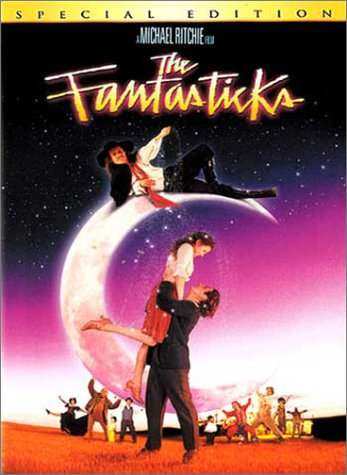 all, that well-known
plagiarist William Shakespeare stole the idea of Romeo and Juliet from
Arthur Brooke's popular poem The Tragicall Hystory of Romeus
and Juliet - and look at how popular and acclaimed Billy-boy's
interpretation became! (And you don't hear the Arthur Brooke groupies
whining about what Shakespeare did.) In short, an interpretation of
something by someone else or even by a different medium may be
different, but can be good in its own way. Second, I watched this movie
on DVD, and I want DVD fanatics to notice that I've managed to control
myself so I will never (unlike other DVD reviewers) gush about owning a
DVD player in the first place, never be one of those that mention they
keep DVDs clean by constant salivating over them, or ever gross out
readers by mentioning how fortunate DVDs have holes in them so one can
take their love for them to a new level. (And probably getting
D-VD in the process.) Guys, please take a valium before you write
another review, okay? Thanks. all, that well-known
plagiarist William Shakespeare stole the idea of Romeo and Juliet from
Arthur Brooke's popular poem The Tragicall Hystory of Romeus
and Juliet - and look at how popular and acclaimed Billy-boy's
interpretation became! (And you don't hear the Arthur Brooke groupies
whining about what Shakespeare did.) In short, an interpretation of
something by someone else or even by a different medium may be
different, but can be good in its own way. Second, I watched this movie
on DVD, and I want DVD fanatics to notice that I've managed to control
myself so I will never (unlike other DVD reviewers) gush about owning a
DVD player in the first place, never be one of those that mention they
keep DVDs clean by constant salivating over them, or ever gross out
readers by mentioning how fortunate DVDs have holes in them so one can
take their love for them to a new level. (And probably getting
D-VD in the process.) Guys, please take a valium before you write
another review, okay? Thanks.
Considering the long and hard road the movie The
Fantasticks has gone through, it's not only amazing that it
ever got made, but that we finally have the chance to see it. Some of
you undoubtedly know of the disasters that have fallen on this
movie, but the answers as to why many of these things happened - such
as the fact it was shelved for five years before finally getting a
theatrical release (to about only six theaters) even to this day seem
murky. I've spent a lot of my own time trying to research the movie's
sad history (even before the movie got released), but I haven't been
able to come up with many answers.
The scenario that probably closest to the actual fact is
as follows: When the movie was completed in 1995, United Artists showed
it to test audiences, though none of these people were devotees of the
stage play. The test results weren't positive, though everyone involved
in the making of the movie realized the tough challenge of
reintroducing modern audiences to  the movie musical.
The movie's release was put on hold until a marketing strategy could be
figured out, but during this time the regime at the studio changed. The
new regime decided that a theatrical release of the movie would just
lose more money for the studio, and wanted to dump the movie on video.
But a clause in director Michael Ritchie's contract stated that the
movie must have some kind of theatrical release first. Neither side was
willing to budge, so the movie stayed on the shelf for the next few
years. Then in 2000, Francis Ford Coppola (now a member of the board at
UA) took a look at the movie, and reedited it (with Ritchie's
blessings) in an attempt to make the movie more attractive to
audiences, and it was finally released. the movie musical.
The movie's release was put on hold until a marketing strategy could be
figured out, but during this time the regime at the studio changed. The
new regime decided that a theatrical release of the movie would just
lose more money for the studio, and wanted to dump the movie on video.
But a clause in director Michael Ritchie's contract stated that the
movie must have some kind of theatrical release first. Neither side was
willing to budge, so the movie stayed on the shelf for the next few
years. Then in 2000, Francis Ford Coppola (now a member of the board at
UA) took a look at the movie, and reedited it (with Ritchie's
blessings) in an attempt to make the movie more attractive to
audiences, and it was finally released.
As you may imagine, the end results are quite
substantially removed from how everything was in the original stage
musical, especially since Coppola chopped out about half an hour from
Ritchie's original cut. (The finished results run less than 90 minutes,
a somewhat bizarre running time for a musical.) Still, those familiar
with the stage musical will still recognize many of the elements. As on
the stage, the movie sets things up by bringing us into the middle of a
feud between two widowed neighbors, Bellomy (Grey) and Hucklebee (Brad
Sullivan). Bellomy has told his young daughter Luisa (Kelly) to stay
away from Hucklebee and his son Matt (Joseph McIntyre, former member of
New Kids On The Block). Likewise, Hucklebee has told Matt to stay away
from the Bellomy's. Despite this divide and their parents' warnings,
both Matt and Luisa have secretly fallen in love, though they have no
idea on how to advance their relationship under these circumstances.
In fact, Bellomy and Hucklebee are also wondering how
their childrens' relationship can advance - it is soon revealed that
the feud is a sham, constructed so that Matt and Luisa would get
together, knowing that children always do the opposite that you command
them. Their savior seems to arrive in the form of El Gallo 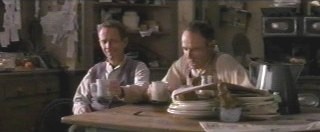 (Jonathon Morris),
the leader of the traveling carnival that has just arrived in the area.
They arrange with him to stage a phony abduction of Luisa, which will
result in Matt becoming a hero, the families reconciling, and the
lovers being given a blessing to go forward. Despite the convoluted
sound of it all, the plan actually is a complete success. However, once
everything is settled and tidy, everyone starts to see love differently
in this new light, and the relationship between Matt and Luisa is
troubled. El Gallo, still in the area, is also not calming things down
by his presence. Is a happy ending still possible? (Jonathon Morris),
the leader of the traveling carnival that has just arrived in the area.
They arrange with him to stage a phony abduction of Luisa, which will
result in Matt becoming a hero, the families reconciling, and the
lovers being given a blessing to go forward. Despite the convoluted
sound of it all, the plan actually is a complete success. However, once
everything is settled and tidy, everyone starts to see love differently
in this new light, and the relationship between Matt and Luisa is
troubled. El Gallo, still in the area, is also not calming things down
by his presence. Is a happy ending still possible?
Now, I have never seen the original stage production, so
while I can't compare what this movie does to how it was done
originally, I at least have the advantage of seeing this movie on its
own terms. Yet despite all of this, it soon became clear to me several
minutes into the movie that the material, for the most part, was not
being directed in a fashion that best complemented it. It quickly
became clear to me that the original stage adaptation was to be an
intimate experience, to be done on a small stage in front of a small
audience, unlike stage musicals like "Show Boat" and "The
Phantom of the Opera".
This can be better illustrated by looking at two musical
numbers early in the movie. Luisa's singing of her dreams (Much More)
reveals to us her secrets to us, so we should feel like we are next to
her, and nobody else can hear. But this is ruined by Ritchie (when he's
not trying to ape portions of The Wizard Of Oz's Over The
Rainbow number) cutting in several shots of Luisa a tiny figure in
widescreen photography of the Arizona plains. Sure, it looks gorgeous,
but the intimate feeling is shattered. Not long afterwards, Grey and
Sullivan sing the duet Never Say No, which is more 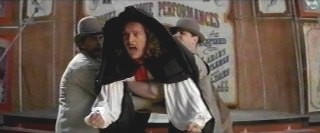 or less a
philosophy about how the mind of children work. It starts off well,
with the two singing while seated down at the breakfast table. But then
the number suddenly transports them to several different rooms of the
house (eventually going outdoors), and eventually they dance together.
It's hard to immediately to figure just what's wrong with this
presentation, but while I was watching it and trying to figure out a
better way for it to be staged, it hit me that a simple song like this
should be simply presented. With that in mind, I could immediately
picture the number working on stage, with the characters unable to jump
around place to place, instead keeping the audience's attention by the
intimate surroundings. or less a
philosophy about how the mind of children work. It starts off well,
with the two singing while seated down at the breakfast table. But then
the number suddenly transports them to several different rooms of the
house (eventually going outdoors), and eventually they dance together.
It's hard to immediately to figure just what's wrong with this
presentation, but while I was watching it and trying to figure out a
better way for it to be staged, it hit me that a simple song like this
should be simply presented. With that in mind, I could immediately
picture the number working on stage, with the characters unable to jump
around place to place, instead keeping the audience's attention by the
intimate surroundings.
In fairness, there are some positive things to note
about the musical numbers. Unlike past movie musicals, where the actors
lip-sync to their previously recorded singing, technology in 1995 was
now advanced enough to allow the actors to sing live (while listening
to the music by earpieces unseen by the audience.) Though there have
certainly been better musicals than The Fantasticks,
they still had that unfortunate slight audio and visual distraction
coming from the lip-syncing. Not here; it's clear that the actors are
singing, and their audio has none of that pre-recording sound it. It's
very impressive. Of course, all the best technical tricks can't save a
mediocre song or a poorly directed musical number. I've already brought
up several examples of the wrong staging for songs, so I think it's
time to point out that there are a few songs here that didn't impress
me. This Plum Is Too Ripe I thought was labored and overdone.
At least Coppola cut out Plant A Radish; included on the DVD as
an extra, it would have brought the movie to a standstill if it were
left in.
But getting back to the positive side of the musical
numbers, there are two such bits that work both in their staging and in
the quality of the song itself. Halfway through the movie we get It
Depends On What You Pay, a fast and rousing song, and it's here
that Ritchie's tendency to pump up the musical number appropriate this
time. Though the movie's low budget ($10 million) does make this number
look a little skimpy, the sudden burst of enthusiasm that the song
brings out of everyone is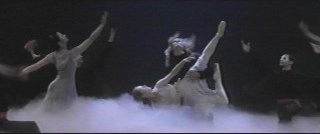 really evident, and
you can't help but get caught up in these few minutes. Too bad the
energy fades away quickly once the song ends. It's not until near the
end of the movie that the second show-stopping number comes up, Round
And Round. Though it also suffers from a somewhat
impoverished look, Ritchie does succeeds in creating the appropriate
dreamy and magical feel for the number. I also couldn't help but notice
that, unlike other moments in the movie, here we feel closer and more
intimate with the characters and the action happening before us. really evident, and
you can't help but get caught up in these few minutes. Too bad the
energy fades away quickly once the song ends. It's not until near the
end of the movie that the second show-stopping number comes up, Round
And Round. Though it also suffers from a somewhat
impoverished look, Ritchie does succeeds in creating the appropriate
dreamy and magical feel for the number. I also couldn't help but notice
that, unlike other moments in the movie, here we feel closer and more
intimate with the characters and the action happening before us.
It's probably no coincidence that these two musical
numbers (as well as the lovely Try To Remember at the very end
of the movie) both showcase Jonathon Morris. Though his physical
resemblance to Kevin Bacon is initially a little disconcerting, this is
quickly forgotten when he immediately starts stealing the show. He
brings an infectious enthusiasm to each and every scene he's in, really
strutting his stuff in the musical numbers with his energetic dancing
and a singing voice many people would kill for. (I can't deny that the
first few words of Round And Round he sang gave me the
shivers.) Clearly, he does more for the movie than it does for him, and
that includes giving El Gallo that extra dimension the script lacks for
him so he come across as an actual character and not a bland stock
character.
Except for Morris, nobody else manages to have their character
individually stand out. Though McIntyre aggravates things with his
acting resembling the dumb jock at your high school thrust upon the
stage during drama class, I can't blame the other actors for their
characters being so unmemorable. There is hardly any stab made at
character development; the first twenty minutes, in fact, are almost
totally devoted to the characters singing. How, for example, are we
supposed to understand and sympathize with Luisa's dreams as she sings
Much More when she's hardly said a spoken 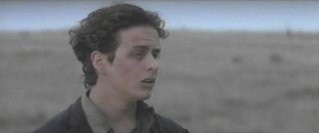 word beforehand? If we knew more about her
before the song, maybe her desires wouldn't sound somewhat selfish as
they do here. If Bellomy and Hucklebee had more of a chance to talk,
maybe we would see they have their kids' best interests at heart,
instead of coming across here as conniving sneaks. And as for the young
lovers...why are they in love? Sure, Romeo and Juliet were just in love
with each others' looks (read the play again if you don't believe me),
though they weren't alive long enough to start heading to the divorce
courts. The lovers here have no excuse; they just seem to have been in
love for so long because the story demands it of them. word beforehand? If we knew more about her
before the song, maybe her desires wouldn't sound somewhat selfish as
they do here. If Bellomy and Hucklebee had more of a chance to talk,
maybe we would see they have their kids' best interests at heart,
instead of coming across here as conniving sneaks. And as for the young
lovers...why are they in love? Sure, Romeo and Juliet were just in love
with each others' looks (read the play again if you don't believe me),
though they weren't alive long enough to start heading to the divorce
courts. The lovers here have no excuse; they just seem to have been in
love for so long because the story demands it of them.
This certainly isn't a good movie, but despite all its problems, there
is something that almost makes it strangely likeable all the same.
Certainly, every so often there is something - a good song, some
impressive cinematography, a pleasing nostalgic feel not seen in the
movies for years, etc. - that does help break the tedium for an
instant. Though when you take a closer look at the movie as a whole,
you sense a sweet center to it. At times, this center seems to say that
this is the true Fantasticks, what reportedly made it so
magical on the stage. I can't be sure, but I can say for certain that
the movie has made me curious enough about the original stage
production that I'll be sure to watch it should it ever come to my city
again.
Note: Those who watch the movie on DVD (DVD, oh
DVD DVD DVDVDVDVDVD - *SLAP!* - thank you) will have the
opportunity to access a special section which contains the footage
Coppola removed from Ritchie's original cut. The deleted footage
consists of (among other things) longer cuts of songs, entire songs
that were removed, snippets of dialogue, and an entire subplot
involving a motorcycle cop played by the late Charles Hallahan. Would
Ritchie's cut have been better? Though Coppola's cut did quicken the
pace and get rid of inconsequential material (like the aforementioned Plant
A Radish number), the removed dialogue actually contains some of
that missing character development. And why on earth did Coppola remove
the opening rendition of Try To Remember, which really would
have started things off on a better tone? All in all, I would give both
cuts essentially the same rating.
UPDATE: I received the following letter from a
reader:
"While reading your review of the film I thought I might be able to add
a
little information regarding the infinite curse that film carried with
it.
No injuries or anything like that, but it simply appeared the
production was in some trouble from the start. The script was
constantly being rewritten on set...minutes before a scene was to be
shot. The DP took forever to light. Hurry up and wait. And the Art
Department was always rushing to finish a set before they were told it
would be needed. That's fine when you are on a 40 million dollar budget
and you can pay overtime and hire additional crew, but when producers
are forced to shut down production after a 12 hour day because they
cannot afford anymore overtime...scenes eventually get chopped and the
film ultimately is suffers for it.
"None of the actors were difficult and the crew fully supported
Michael's
vision and all worked very hard and long, tedious hours. Each day he...
would walk around the set and prepare for his days' shoot...all the
time knowing he probably wouldn't complete the days' schedule for
various reasons. It was a vicious cycle he constantly attempted to
repair and avoid. He would plan the day by picking and choosing what
would ultimately have to be taken out.
"He did the best he could and has proven he's talented, but he was
cornered in this situation with an unstable distributor, little money,
an unrealistic production schedule, and a location that was so far away
from civilization, where if anyone forgot anything, or scenes needed to
be shuffled for whatever reason, The department(s) necessary wouldn't
have time to pull it all together quickly enough. Not to mention the
Southern Arizona monsoons ruined the last two days of the shoot in AZ
and the transportation department got 3 cherry pickers stuck in the
mud. It was a disaster. However, when all is said and done, no one
cares what hurdles a movie must jump. It only matters if it's a good
film.
"I would appreciate it if you would leave my name anonymous and where
you received any of this information if you do in fact choose to
reference any of it. Thank you and it was an enjoyable read. I will be
back. And may
Michael Ritchie's soul rest in peace. He was a very endearing and
sincere
man - trying his best."
Check for availability on Amazon (VHS)
Check for availability on Amazon (DVD)
Check for availability of 1960 Broadway cast soundtrack (CD)
Check Amazon for The Fantasticks' scrapbook and illustrated text
See also: The Apple, Shock Treatment, Voyage
Of The Rock Aliens
|

 all, that well-known
plagiarist William Shakespeare stole the idea of Romeo and Juliet from
Arthur Brooke's popular poem The Tragicall Hystory of Romeus
and Juliet - and look at how popular and acclaimed Billy-boy's
interpretation became! (And you don't hear the Arthur Brooke groupies
whining about what Shakespeare did.) In short, an interpretation of
something by someone else or even by a different medium may be
different, but can be good in its own way. Second, I watched this movie
on DVD, and I want DVD fanatics to notice that I've managed to control
myself so I will never (unlike other DVD reviewers) gush about owning a
DVD player in the first place, never be one of those that mention they
keep DVDs clean by constant salivating over them, or ever gross out
readers by mentioning how fortunate DVDs have holes in them so one can
take their love for them to a new level. (And probably getting
D-VD in the process.) Guys, please take a valium before you write
another review, okay? Thanks.
all, that well-known
plagiarist William Shakespeare stole the idea of Romeo and Juliet from
Arthur Brooke's popular poem The Tragicall Hystory of Romeus
and Juliet - and look at how popular and acclaimed Billy-boy's
interpretation became! (And you don't hear the Arthur Brooke groupies
whining about what Shakespeare did.) In short, an interpretation of
something by someone else or even by a different medium may be
different, but can be good in its own way. Second, I watched this movie
on DVD, and I want DVD fanatics to notice that I've managed to control
myself so I will never (unlike other DVD reviewers) gush about owning a
DVD player in the first place, never be one of those that mention they
keep DVDs clean by constant salivating over them, or ever gross out
readers by mentioning how fortunate DVDs have holes in them so one can
take their love for them to a new level. (And probably getting
D-VD in the process.) Guys, please take a valium before you write
another review, okay? Thanks. the movie musical.
The movie's release was put on hold until a marketing strategy could be
figured out, but during this time the regime at the studio changed. The
new regime decided that a theatrical release of the movie would just
lose more money for the studio, and wanted to dump the movie on video.
But a clause in director Michael Ritchie's contract stated that the
movie must have some kind of theatrical release first. Neither side was
willing to budge, so the movie stayed on the shelf for the next few
years. Then in 2000, Francis Ford Coppola (now a member of the board at
UA) took a look at the movie, and reedited it (with Ritchie's
blessings) in an attempt to make the movie more attractive to
audiences, and it was finally released.
the movie musical.
The movie's release was put on hold until a marketing strategy could be
figured out, but during this time the regime at the studio changed. The
new regime decided that a theatrical release of the movie would just
lose more money for the studio, and wanted to dump the movie on video.
But a clause in director Michael Ritchie's contract stated that the
movie must have some kind of theatrical release first. Neither side was
willing to budge, so the movie stayed on the shelf for the next few
years. Then in 2000, Francis Ford Coppola (now a member of the board at
UA) took a look at the movie, and reedited it (with Ritchie's
blessings) in an attempt to make the movie more attractive to
audiences, and it was finally released. (Jonathon Morris),
the leader of the traveling carnival that has just arrived in the area.
They arrange with him to stage a phony abduction of Luisa, which will
result in Matt becoming a hero, the families reconciling, and the
lovers being given a blessing to go forward. Despite the convoluted
sound of it all, the plan actually is a complete success. However, once
everything is settled and tidy, everyone starts to see love differently
in this new light, and the relationship between Matt and Luisa is
troubled. El Gallo, still in the area, is also not calming things down
by his presence. Is a happy ending still possible?
(Jonathon Morris),
the leader of the traveling carnival that has just arrived in the area.
They arrange with him to stage a phony abduction of Luisa, which will
result in Matt becoming a hero, the families reconciling, and the
lovers being given a blessing to go forward. Despite the convoluted
sound of it all, the plan actually is a complete success. However, once
everything is settled and tidy, everyone starts to see love differently
in this new light, and the relationship between Matt and Luisa is
troubled. El Gallo, still in the area, is also not calming things down
by his presence. Is a happy ending still possible? or less a
philosophy about how the mind of children work. It starts off well,
with the two singing while seated down at the breakfast table. But then
the number suddenly transports them to several different rooms of the
house (eventually going outdoors), and eventually they dance together.
It's hard to immediately to figure just what's wrong with this
presentation, but while I was watching it and trying to figure out a
better way for it to be staged, it hit me that a simple song like this
should be simply presented. With that in mind, I could immediately
picture the number working on stage, with the characters unable to jump
around place to place, instead keeping the audience's attention by the
intimate surroundings.
or less a
philosophy about how the mind of children work. It starts off well,
with the two singing while seated down at the breakfast table. But then
the number suddenly transports them to several different rooms of the
house (eventually going outdoors), and eventually they dance together.
It's hard to immediately to figure just what's wrong with this
presentation, but while I was watching it and trying to figure out a
better way for it to be staged, it hit me that a simple song like this
should be simply presented. With that in mind, I could immediately
picture the number working on stage, with the characters unable to jump
around place to place, instead keeping the audience's attention by the
intimate surroundings. really evident, and
you can't help but get caught up in these few minutes. Too bad the
energy fades away quickly once the song ends. It's not until near the
end of the movie that the second show-stopping number comes up, Round
And Round. Though it also suffers from a somewhat
impoverished look, Ritchie does succeeds in creating the appropriate
dreamy and magical feel for the number. I also couldn't help but notice
that, unlike other moments in the movie, here we feel closer and more
intimate with the characters and the action happening before us.
really evident, and
you can't help but get caught up in these few minutes. Too bad the
energy fades away quickly once the song ends. It's not until near the
end of the movie that the second show-stopping number comes up, Round
And Round. Though it also suffers from a somewhat
impoverished look, Ritchie does succeeds in creating the appropriate
dreamy and magical feel for the number. I also couldn't help but notice
that, unlike other moments in the movie, here we feel closer and more
intimate with the characters and the action happening before us. word beforehand? If we knew more about her
before the song, maybe her desires wouldn't sound somewhat selfish as
they do here. If Bellomy and Hucklebee had more of a chance to talk,
maybe we would see they have their kids' best interests at heart,
instead of coming across here as conniving sneaks. And as for the young
lovers...why are they in love? Sure, Romeo and Juliet were just in love
with each others' looks (read the play again if you don't believe me),
though they weren't alive long enough to start heading to the divorce
courts. The lovers here have no excuse; they just seem to have been in
love for so long because the story demands it of them.
word beforehand? If we knew more about her
before the song, maybe her desires wouldn't sound somewhat selfish as
they do here. If Bellomy and Hucklebee had more of a chance to talk,
maybe we would see they have their kids' best interests at heart,
instead of coming across here as conniving sneaks. And as for the young
lovers...why are they in love? Sure, Romeo and Juliet were just in love
with each others' looks (read the play again if you don't believe me),
though they weren't alive long enough to start heading to the divorce
courts. The lovers here have no excuse; they just seem to have been in
love for so long because the story demands it of them.